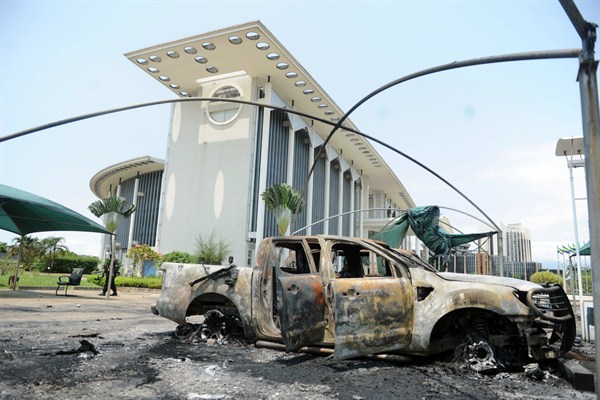Most observers, myself included, expected Gabon’s incumbent president, Ali Bongo Ondimba, to win his country’s election late last month. Few, however—again including me—anticipated the degree of violence and apparent fraud that would accompany the process. Bongo is now reconsolidating power in the aftermath of an intensely contested election. If his victory stands, it will demonstrate that Gabon’s opposition has few tools with which to challenge the results, and that the international community has little will to sanction Bongo and his inner circle.
When elections were held on Aug. 27, Bongo barely won. Gabon’s electoral framework stipulated that the winner needed a plurality, rather than a majority, of the vote. With the opposition surprisingly unified around one candidate, Jean Ping, a former African Union Commission chairman and Gabonese Cabinet minister, the election became a two-man race. The official results gave Bongo 49.8 percent and Ping 48.23 percent, with eight other candidates dividing the remaining roughly 2 percent of the vote.
In geographical terms, the structure of Bongo’s victory was simple; see IRIN’s helpful chart on their Gabon elections page. The further southeast one looks, the better Bongo did. Bongo only carried three of the country’s nine provinces—Haut-Ogooue, Bongo’s home province, located in the far southeast; and Ogooue-Lolo and Ogooue-Ivindo, the two provinces that border Haut-Ogooue. But he also carried significant minority shares of the vote in some of the most populous provinces. For instance, in the coastal province of Estuaire, where the capital Libreville is located, Ping got his highest vote tally—71,868 votes, or nearly 61 percent of the total there. But Bongo also won some 44,000 votes in Estuaire, or more than 37 percent. Ping didn’t score a blowout victory in any province, whereas Bongo had a suspiciously huge one in Haut-Ogooue: approximately 68,000 votes to Ping’s 3,000, good for 95 percent of votes in the province.

